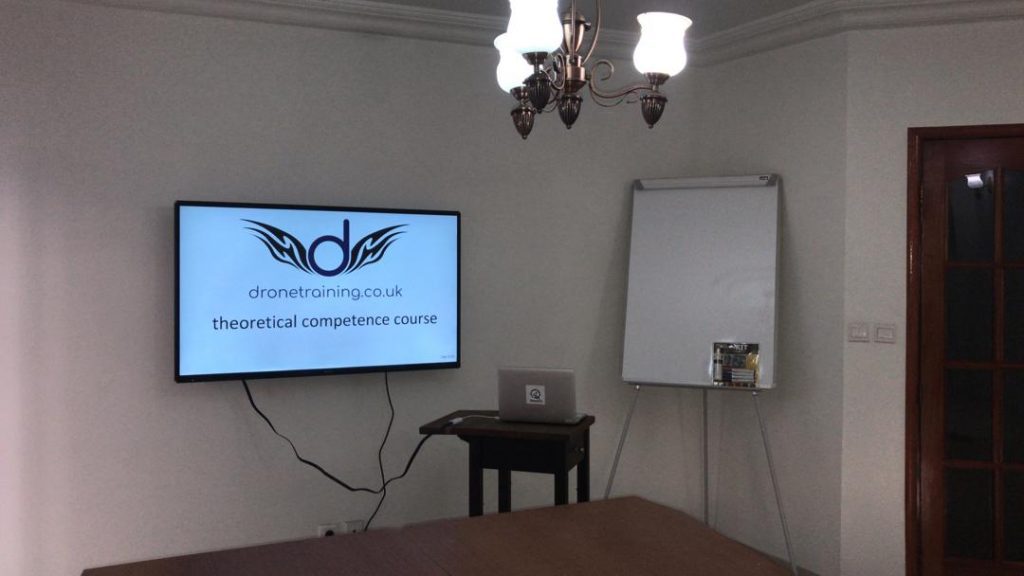
Senegal Flying Labs Offers the First International Drone Pilot Certification for Africans, Taught By Africans
January 7th, 2020

As Flying Labs work to bring the highest standards to their communities, Senegal Flying Labs has been spearheading the world's first local UK Civil Aviation Authority RPAS competency course in Dakar. From December 9th - 13th, four students engaged with the eight theoretical modules and the flight assessment as part of obtaining their UK CAA certificate of competency. The candidates for certification came from Benin, Cameroon, and Nigeria for the first-ever training of this type to be delivered in Africa by an African instructor and examiner for African students.
Drone Training Ltd instructor and Senegal Flying Labs Director Tiamiyou Radji, completed on December 12th, at Kranth's offices in Dakar, which houses Senegal Flying Labs—the first international certification session led by an African for Africans.
Drone Training Ltd's philosophy aims to ensure that pilots have access to the best resources available for their companies, so they place safety and professionalism at the heart of their work. Based in Norwich, England, and co-founded by veteran pilots Elliott Corke and Jonathan Carter, Drone Training Ltd operates a drone training academy with a drone flight training center. They work with a multidisciplinary team of four instructors and examiners, including Mr. Radji, who organizes as part of Senegal Flying Labs' activities, Global Drone Training courses in West Africa.
For Flying labs, this is the next step in being able to build local capacity, and it's a big step. This certificate of competency is sanctioned and recognized by a national authority. It teaches and validates all the required aspects of safe and professional drone operations, from weather to navigational charts to flight skills. Furthermore, it makes ensuring operations much easier as operators can now document their qualifications and standard procedures.

For local operators, the certification also includes emergency procedures and incident management, plus reading aeronautical charts and forecasting weather, and the areas authorized for UAV overflights. At the end of the course, the pilots can answer the following questions:
- A plane suddenly violated your airspace. What are you going to do about it?
- In which type of flight mode do most commercial operations take place?
- Which of the following is not a vital element of the aviation discipline?
- In terms of security, why checklists essential?
- What process is the risk mitigation part of?
- The final decision to proceed with an operation is based on what?
- In the event of a risk of a frontal collision, aircraft pilots are trained to?
- What should you do if you see or hear another aircraft while flying a drone?
At the end of this training, pilots such as Arsene, Ouriel from Benin, Dozie, and Adesina from Nigeria and Brandon Ebode Muaka from Cameroon had the necessary know-how to fly drones per current international standards. This certification is also a quality label, professionalizing local pilots by giving them the required qualifications to bid for any contract on the international scene. Further, it enables national civil aviation authorities in Africa to use a professional basis to authorize the activities of a drone pilot.
To be certified, the trainees must pass eight consecutive tests on all the necessary knowledge required to fly under the certificate of competency with a 75 percent pass/fail threshold. Their assessment covers aircraft knowledge, aviation and aviation safety, airspace operating principles (SARS), air law, meteorology, navigation and nautical charts, human factors, and operating procedures. Finally, they must-pass an operational flight assessment to simulate situational awareness.
One of Senegal Flying Labs' key roles is to transfer knowledge and build capacity locally. Thanks to the support of WeRobotics, Kranth, and Drone Training Ltd, we can provide drone professionals in West Africa with one of the world's best flight certification standards. We will continue to offer UK certificate of competency courses and exams to professionalize the field and make operations safer and more ubiquitous in the region.
Recent Articles

